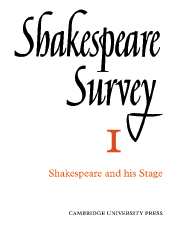Book contents
- Frontmatter
- Studies in the Elizabethan Stage since 1900
- Titus Andronicus on the Stage in 1595
- A Note on the Swan Theatre Drawing
- The Bankside Theatres: Early Engravings
- Shakespeare and the Blackfriars Theatre
- Shakespeare’s Bad Poetry
- The Folger Shakespeare Library
- The Heritage of Shakespeare’s Birthplace
- Three Shakespearian Productions: A Conversation
- Four Lears
- London Productions
- Stratford Productions
- International News
- The Year's Contributions to Shakespearian Study 1 Critical Studies
- 2 Shakespeare’s Life and Times
- 3 Textual Studies
- Books Received
- Index
- Plate section
Four Lears
Published online by Cambridge University Press: 28 March 2007
- Frontmatter
- Studies in the Elizabethan Stage since 1900
- Titus Andronicus on the Stage in 1595
- A Note on the Swan Theatre Drawing
- The Bankside Theatres: Early Engravings
- Shakespeare and the Blackfriars Theatre
- Shakespeare’s Bad Poetry
- The Folger Shakespeare Library
- The Heritage of Shakespeare’s Birthplace
- Three Shakespearian Productions: A Conversation
- Four Lears
- London Productions
- Stratford Productions
- International News
- The Year's Contributions to Shakespearian Study 1 Critical Studies
- 2 Shakespeare’s Life and Times
- 3 Textual Studies
- Books Received
- Index
- Plate section
Summary
The middle-aged and the old admit that the English Theatre is, to-day, at the richest point within their memory. Wealth is offered on every side and certainly no generation before has been given the opportunity of seeing four different interpretations of Lear in as many months, all offered by companies of reputation. I myself, with my grey hairs, have only twice before seen the play.
So much has been written about the London Old Vic production that I will be brief about it. At the risk of being deemed a blasphemer, let me say that I did not think this a great King Lear nor did I think it one of Sir Laurence Olivier's great performances. I did not feel that it could compare with either his Richard Third or his Oedipus, in both of which parts he had sought and found the soul of the character. In Lear, it seemed to me, he was not concerned to identify himself with the raging torrent that stormed through the mind of the poor madman; his chief aim, I felt, was to make the public accept his own objective interpretation of an old dotard. One should not be hide-bound by tradition, but it is difficult to believe in a Lear whose “Every inch a king” is not a boastful assertion of his unquestionable majesty, but a casual aside which, to those who do not know the play, might pass unnoticed. Surely the words demand declamation and no other intention can have been in the author's mind. It is only the incomparable magnetism and vigour of Olivier's personality that made one understand the carefully thought-out reason behind this interpretation. His Lear is a king who has always been a king, who has never questioned his own majesty, and when Gloucester asks him “Is it the King?” the matter to him is so obvious that it hardly seems worth a reply. It was on this conception that the whole performance was built. The deliberate caprice and pranking of the first act gave us a testy old man for whom it was difficult to obtain sympathy in the later scenes; but it would be wrong to suggest that it was possible to sit unmoved whilst Olivier's overwhelming sense of poetry wafted us through the grandeurs of the last act. Olivier is master of the unexpected.
- Type
- Chapter
- Information
- Shakespeare Survey , pp. 98 - 102Publisher: Cambridge University PressPrint publication year: 1948

